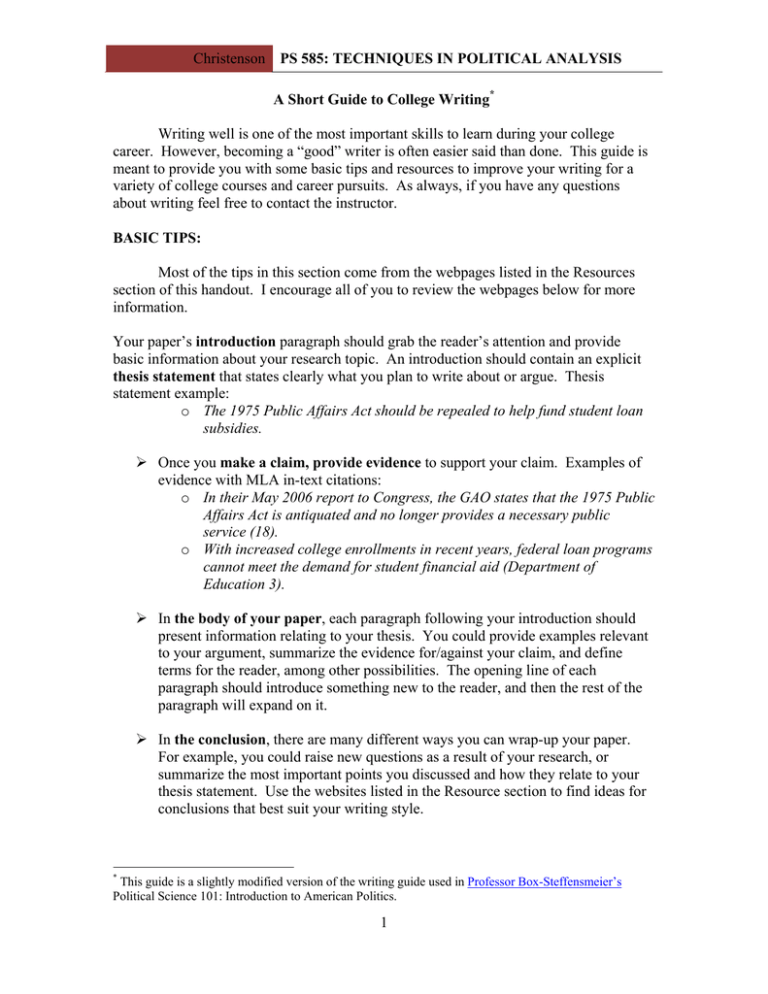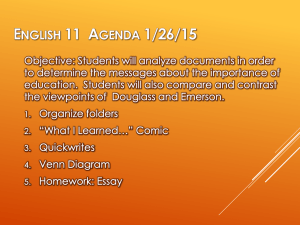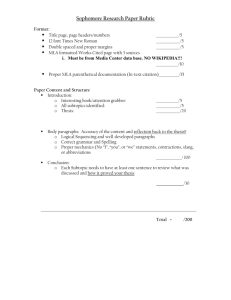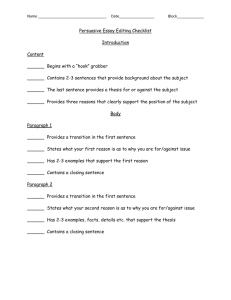Christenson Writing well is one of the most important skills to... career. However, becoming a “good” writer is often easier...
advertisement

Christenson PS 585: TECHNIQUES IN POLITICAL ANALYSIS A Short Guide to College Writing* Writing well is one of the most important skills to learn during your college career. However, becoming a “good” writer is often easier said than done. This guide is meant to provide you with some basic tips and resources to improve your writing for a variety of college courses and career pursuits. As always, if you have any questions about writing feel free to contact the instructor. BASIC TIPS: Most of the tips in this section come from the webpages listed in the Resources section of this handout. I encourage all of you to review the webpages below for more information. Your paper’s introduction paragraph should grab the reader’s attention and provide basic information about your research topic. An introduction should contain an explicit thesis statement that states clearly what you plan to write about or argue. Thesis statement example: o The 1975 Public Affairs Act should be repealed to help fund student loan subsidies. ¾ Once you make a claim, provide evidence to support your claim. Examples of evidence with MLA in-text citations: o In their May 2006 report to Congress, the GAO states that the 1975 Public Affairs Act is antiquated and no longer provides a necessary public service (18). o With increased college enrollments in recent years, federal loan programs cannot meet the demand for student financial aid (Department of Education 3). ¾ In the body of your paper, each paragraph following your introduction should present information relating to your thesis. You could provide examples relevant to your argument, summarize the evidence for/against your claim, and define terms for the reader, among other possibilities. The opening line of each paragraph should introduce something new to the reader, and then the rest of the paragraph will expand on it. ¾ In the conclusion, there are many different ways you can wrap-up your paper. For example, you could raise new questions as a result of your research, or summarize the most important points you discussed and how they relate to your thesis statement. Use the websites listed in the Resource section to find ideas for conclusions that best suit your writing style. * This guide is a slightly modified version of the writing guide used in Professor Box-Steffensmeier’s Political Science 101: Introduction to American Politics. 1 Christenson PS 585: TECHNIQUES IN POLITICAL ANALYSIS ¾ When quoting other authors or paraphrasing their ideas, be sure cite them in your paper. Most college students use MLA format, but there are other formats that are popular including APA and Chicago. For the purpose of this course, use whatever accepted format you are most comfortable with. If you are unsure whether you need to cite an author, always err on the side of caution and cite the source of the information. o Avoid citing Wikipedia, Answers.com, and related websites. Because anyone can post anything on these websites, we cannot be sure of the information’s accuracy. Only use information from respected sources (e.g., scholarly works, government offices, non-profit organizations, etc.). ¾ Proofread your work. Misspellings and grammatical errors greatly reduce the quality of your paper, even if you make a compelling argument. Often times, people miss grammatical errors when they read a paper on a computer screen. To help alleviate this problem, you could read your paper aloud or print off a copy and then proofread it. If you trust your roommate or another friend, ask them to proofread your paper. RESOURCES: OSU Writing Center, Phone (614) 688-4291, http://cstw.osu.edu/writingCenter/ The Writing Center provides free and helpful consultations for students on how to prepare papers for their college courses (e.g., proper use of citations in MLA and APA format, how to create an interesting introduction/thesis statement, etc.). The “Resource” link on the left side of the page provides many useful tips for college writing. Don’t be afraid to contact the Writing Center, their staff members are there to support you. Writing in College: A Short Guide to College Writing, http://writingprogram.uchicago.edu/resources/collegewriting/ Two professors at the University of Chicago put together this website. We strongly recommend you review the first section: “Some crucial differences between high school and college writing.” The website is easy to understand and very comprehensive. The Elements of Style, http://www.bartleby.com/141/ This online book covers a lot of the basics of paper composition. Although it is intended for English courses, the information is applicable to almost any type of college class. The Nuts and Bolts of College Writing, http://nutsandbolts.washcoll.edu/ This webpage contains tons of information on how to structure your paper from the introduction to the conclusion, writing mechanics (e.g., grammar, punctuation, etc.), how to clarify your writing, among other items. 2




